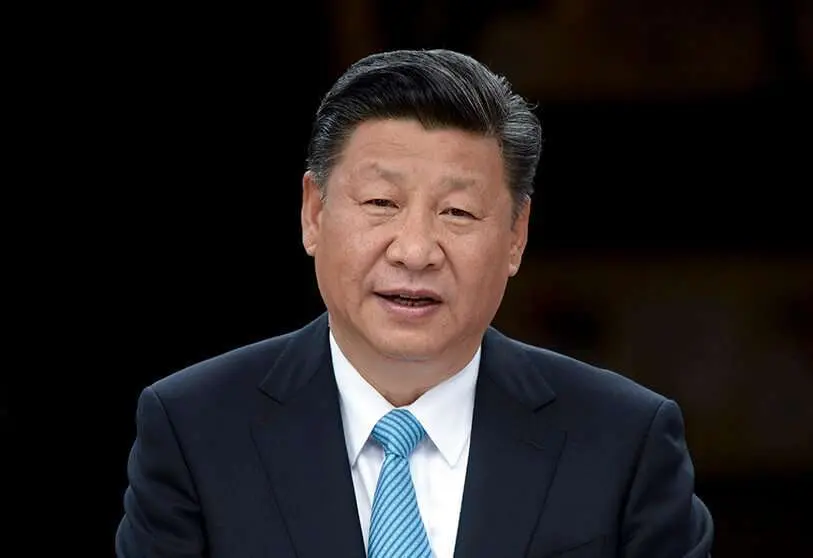Xi Jinping bares his teeth as the EU and the US resume their dialogue on China

"The Chinese people will not create trouble but nor are we afraid, and no matter the difficulties or challenges that we face, our legs will not shake and our backs will not bend. Any country or any army, no matter how powerful they used to be, standing against the trend of the international community and acting perversely ... will surely backfire". This was the focus of Chinese President Xi Jinping's speech in the vast Beijing's Great Hall of the People to commemorate the 70th anniversary of China's entry into the Korean War (1950-1953). It was an occasion to mark territory, especially against the United States, with whom the current commercial warfare and geopolitical influence are preluding a much hotter confrontation.
In front of an audience of veterans in that war, leaders of the Chinese Communist Party (CCP) and the highest-ranking military officers of the Armed Forces, Xi Jinping promised that "we will never allow any force to invade or divide the sacred territory of the motherland". In this warning he included Taiwan once again, as an indivisible part of that homeland, launching a thinly veiled threat to those inside and outside the prosperous island who advocate a fully internationally recognized independence.
This speech by Xi Jinping is the most markedly warlike since he took power, an undeniable symptom that the tensions with his great rival, the United States, have not only not diminished but are in danger of escalating. In another passage of his speech, and after paying tribute to the 200,000 Chinese soldiers who perished in the Korean War, the maximum leader of Beijing, and the one accumulating the greatest power since Mao Zedong, demanded a greater acceleration in the modernization of the Chinese Armed Forces, from the Army to the new space warfare units.
The echoes of Xi Jinping's warnings had not yet died down when US Secretary of State Mike Pompeo was embarking on a tour of Asia with two special destinations: India and Sri Lanka. The first is China's great continental rival, and there is little doubt that the United States wants to strengthen New Delhi's military power to match that of China to the maximum. As for the former island of Ceylon, one of the biggest beneficiaries of China's political and economic diplomacy in the New Silk Road program, Washington wants it to reduce both its dependence and its heavy debt to Beijing. It will offer both countries substantial advantages that will compensate for that effort, but a far from hidden competition is emerging to establish alliances that will undoubtedly be decisive in the increasingly possible case of an open and frontal Chinese-American clash.
At the same time, the European Union and the United States have decided to create a forum for dialogue that is practically mono-thematic, since all the analyses will revolve around China and its hypothetical threat to world order. The idea was launched in June by the EU's High Representative for the Common Foreign and Security Policy, Josep Borrell, and now taken up by his US colleague, Mike Pompeo. The latter describes it as a meeting between transatlantic partners "in the face of an immense challenge," which Pompeo identifies with the threats of the Chinese Communist Party.
Although we are already on the verge of the US presidential elections, the Secretary of State proclaims from all the stands that, no matter who occupies the White House for the next four years, the military actions that China carries out against its neighbors on its southern coasts will not disappear, nor will its human rights abuses or its "predatory economic practices".
With respect to the latter, Washington has no qualms about showing its hostility to Huawei, a company it describes as the main spearhead of the CCP's worldwide technological espionage. In recent months, a US mission has made an intermittent tour around Europe, including Spain, to try to dissuade the former allies from including Huawei's 5G technology in their networks, a task of which threats are not absent when the government concerned is not very convinced.
The forum in question is already taking note of the asymmetry that the coronavirus pandemic is causing on a global scale. Spread throughout the world from a laboratory and/or a Chinese market, and regardless of the different ways of dealing with it, the truth is that China not only comes out much less weakened from the pandemic than the rest of the planet, but is even the only power with positive economic growth in the face of the huge collapse of all the others. All of this, together with Xi Jinping's warnings, and practices such as the massive subsidy for the manufacture of his planes while Boeing and Airbus fight and weaken each other by imposing mutual and gigantic sanctions, makes this new forum more than a place for debate, probably a coordinating body for the adoption of common decisions and actions of great significance.

